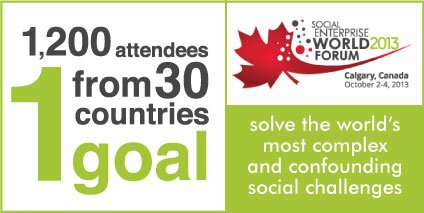Walking the Talk: How can we learn to be better collaborators?
By Tim Draimin, Executive Director of Social Innovation Generation (SiG) National
Note: SiG is an organizing partner for SEWF 2013. Tim is facilitating a SEWF 2013 session called “Social Innovation Labs.” People that enjoy this article may wish to check out the SEWF 2013 program streams “Social Innovation” and “Collaboration.”
This article originally appeared on the SiG blog, a great resource for articles on social innovation.
The feature picture is courtesy of Compfight / A Flickr Search Tool.
Making it Work: Building Partnership Competencies
How do we align all this talk about collaboration with the robust capability to execute on it in ways that can change the world?
Fortunately there is a growing infrastructure of training, educational and advisory resources on collaboration. Here are several:
Tamarack Institute: Canada’s Leading Collaboration Resource
Tamarack Institute, Canada’s leading capacity building organization for the community sector, will be running their annual Communities Collaborating Together: Accelerating Our Impact this October 7-11 in Edmonton. This follows their April event – in partnership with FSG and John Kania – a 3 day educational training for 150 leaders called Champions for Change that provided
“a detailed look at the roles played by backbone leaders; dealing with complex issues in a changing and emergent environment; collective governance; shared value; and, exploring the development of a collective impact initiative over four phases of maturity.”
Partnership Brokers Association
A unique and important global training organization, the Partnership Brokers Association (PBA), has built deep knowledge and learning about partnerships and what makes them succeed. (Full disclosure: I just joined their board.)
PBA is training and supporting a worldwide community of partnership brokers who, working as consultants or employees from inside an organization, bring strong professional competencies to the development and fulfillment of new collaborative ventures that cross sectors and organizational boundaries. Brokers fulfill two major functions:
- Helping partners address typical partnering challenges
- Improving a partnership’s efficiency, effectiveness and innovation
PBA has published a guide entitled What Do Partnership Brokers Do? And they have recently started a new journal Betwixt and Between that is “the platform for stories from partnership brokers everywhere – bringing together insights in practice, thought leadership and critical analysis.”
According to the PBA Board chair, Microsoft executive Greg Butler, writing in Good for Business?, we need to shift from transactional partnerships to transformational ones:
“Partnerships come in all shapes and sizes. In the private sector, many so-called ‘development partnerships’ are essentially transactional and tactical involving philanthropy on the one hand or service-type contractual arrangements on the other. However, we came to realize in Microsoft that a true partnership approach is something very different. A better managed and understood partnering process can lead to genuine win-win collaboration—where the conversation moves from ‘here’s some money, this is what we expect you to deliver’ to ‘this is the problem/challenge, how can we solve it together?’”
Operating without great fanfare, PBA has been training small numbers of Canadians for some years. In fact, a Newfoundland and Labrador government department – The Rural Secretariat – has ensured that all its staff have taken at least the PBA’s Level 1 Training since they employ PBA’s partnership approach to achieve their mandate. As the Rural Secretariat explains, they are
“a unique and innovative Provincial Government entity that strives to advance the sustainability of rural Newfoundland and Labrador communities and regions…by engaging the public in deliberative dialogue about sustainability issues and challenges [and] supporting collaboration between and among rural stakeholders including governments…”
PBA partners with local hosts to bring their trainings to Canada. The next 4-day Level 1 training is in partnership with JS Daw & Associates in Calgary the week of September 24th. The following session will be in Ottawa in March or April 2014.
The Intersector Project
Among the new resources in the collaboration ecosystem is an emerging organization, The Intersector Project (TIP). It is a merger of Tri-Sector Forum and the Collaborative Governance Resources Institute. Its goal is to enable
“intersector leaders across the business, government and non-profit sectors to come together and create new solutions to society’s most pressing problems and challenges.”
TIP recognizes that “the most pressing challenges we face as a society – such as access to education, the rising cost of healthcare, energy security and infrastructure redevelopment – are best addressed through collaboration among and between the business, government and non-profit sectors.”
“Successful collaboration is not easy, however,” says TIP.
“Reaching innovative solutions requires a complex set of collaboration strategies and processes that ensure the right people are engaging in the right way. Shepherding this along requires a unique type of leader who has the mindset, skills and networks to appreciate, engage and collaborate with and among all three sectors.”
TIP will be providing professional services supporting these types of boundary spanning initiatives.
Moving Forward Together
The Toronto organization Rethinking Sustainability Initiatives (RSI) is also working to build strength in partnership building. RSI describes itself as
“a hub for leaders who want to optimize sustainability and innovation for greater business and societal success.”
On June 20th they hosted Taking Action: The Power of Collaboration, which “explored how diverse groups of business leaders and subject matter experts took action to break through traditional sustainability barriers with strategic collaborators…And what the collaborators would do differently if they could do it again.”
Two leaders in Deloitte’s public sector practice, US-Based William Eggers and Canadian Paul Macmillan, have a new book coming out entitled: The Solution Revolution: How Business, Government and Social Enterprises are Teaming Up to Solve Society’s Toughest Problems. They are identifying the importance of promoting a solutions ecosystem where
“all the elements together draw strength from the diversity of contributions that collectively target all aspects of a given social challenge.”
“all the elements together draw strength from the diversity of contributions that collectively target all aspects of a given social challenge.”
There is much cause for hope that we can move from a country of siloed efforts to one with a deep culture of effective cross-sector partnerships. The next step is where the rubber hits the road and we look forward to sharing the stories of breakthrough success in this collaborative new world.
More about Tim Draimin:
Tim Draimin is ED of Social Innovation Generation (SiG) (partnership of McConnell Family Foundation, Toronto’s MaRS innovation hub, University of Waterloo, SiG West) supporting accelerated strengthening of Canada’s Social Innovation ecosystem. SiG’s programs address Canadians’ ability to innovate to overcome large scale complex social and environmental challenges through new forms of problem solving via cross-sectoral partnerships and social innovation labs. SiG convened the Canadian Task Force on Social Finance, proposing a seven-point agenda for mobilizing private capital for public good. Tim authored Canada’s first national study of social entrepreneurship, is co-author of a new study on corporate social innovation and is a frequent advisor to government, non-profit associations and business. He is a member of governance or advisory boards of Trico and Catherine Donnelly Foundations, Partnership Brokers Association, Grand Challenges Canada, Youth Social Innovation Fund, and Centre for Impact Investing.
More about SiG:
 Social Innovation Generation (SiG) National is a partnership of The J.W. McConnell Family Foundation, Toronto’s MaRS Discovery District, the University of Waterloo; and Vancouver’s PLAN Institute. By fostering social innovation, SiG enables the creativity of social innovators to tackle the profound social and environmental challenges facing Canadians.
Social Innovation Generation (SiG) National is a partnership of The J.W. McConnell Family Foundation, Toronto’s MaRS Discovery District, the University of Waterloo; and Vancouver’s PLAN Institute. By fostering social innovation, SiG enables the creativity of social innovators to tackle the profound social and environmental challenges facing Canadians.
SiG’s role is to help enable Canadians’ ability to innovate to overcome large scale complex social and environmental challenges through change- or solution-labs and new forms of cross-sectoral partnerships.
SiG convened the Canadian Task Force on Social Finance, a blue ribbon panel that proposed a seven-point agenda for mobilizing private capital for public good.
Tags: Collaboration, Measuring Impact, SEWF Speakers, SiG, Tim Draimin












